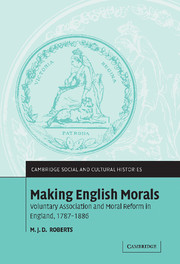Book contents
- Frontmatter
- Contents
- Preface
- Acknowledgements
- List of abbreviations
- Introduction
- 1 Moral reform in the 1780s: the making of an agenda
- 2 ‘The best means of national safety’: moral reform in wartime, 1795–1815
- 3 Taming the masses, 1815–1834
- 4 From social control to self-control, 1834–1857
- 5 Moral individualism: the renewal and reappraisal of an ideal, 1857–1880
- 6 The late Victorian crisis of moral reform: the 1880s and after
- Conclusion
- Select bibliography
- Index
6 - The late Victorian crisis of moral reform: the 1880s and after
Published online by Cambridge University Press: 01 July 2009
- Frontmatter
- Contents
- Preface
- Acknowledgements
- List of abbreviations
- Introduction
- 1 Moral reform in the 1780s: the making of an agenda
- 2 ‘The best means of national safety’: moral reform in wartime, 1795–1815
- 3 Taming the masses, 1815–1834
- 4 From social control to self-control, 1834–1857
- 5 Moral individualism: the renewal and reappraisal of an ideal, 1857–1880
- 6 The late Victorian crisis of moral reform: the 1880s and after
- Conclusion
- Select bibliography
- Index
Summary
On 4 July 1887 in the Albert Hall the RSPCA held its annual general meeting. Seven thousand supporters attended, among them Queen Victoria, the society's patron since 1835. The society, on behalf of its office-bearers and ninety-two English and Welsh branches, offered the monarch its respectful congratulations on her Jubilee, noting the unprecedented way in which ‘the moral and material elevation of our countrymen’ had extended during the fifty years of her reign. The Queen, in gracious reply, let it be known that she believed that at least some of the credit for ‘the spread of enlightenment’ among her subjects was to be attributed to ‘the labours of your society’. She was then invited to present the prizes to the winners of a society-sponsored essay competition for schoolchildren contested among 26,000 entrants. In spite of society secretary John Colam's best organisational efforts, proceedings ended in some confusion and the Queen appears to have arrived at her next destination (Paddington station) rather earlier than planned. Press reporting of the event, however, was forgiving, affectionate, even flattering, with at least one editorialist claiming that the ‘enormous service’ of the society towards achieving a ‘transformation’ of ‘the national character’ allowed the English to ‘fairly claim to be at the head of all civilised peoples’.
By 1887, in short, the RSPCA had become a national institution. RSPCA advice was received with respect by public authorities. More remarkably still, as veteran members could readily recall, RSPCA values had been appropriated as national values.
- Type
- Chapter
- Information
- Making English MoralsVoluntary Association and Moral Reform in England, 1787–1886, pp. 245 - 289Publisher: Cambridge University PressPrint publication year: 2004

